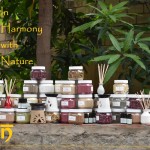Tamra Patra

Copper, one of the earliest elements known to man, was said to be discovered in Iraq about 9,000 B.C. The word copper originated from the Latin language (Cuprus).
The making of copper and brass vessels is one the most flourishing traditional crafts in Pune. Copper smiths (tambats in Marathi) were brought to Pune from the Konkan region during the reign of the Peshwas in the 18th century to make copper coins. Initially four or five families moved to Pune but their numbers grew and eventually the tambats made Pune their own. Apart from coins, they started making weapons, and kitchen utensils, temple items used by the royal family.
The traditional craft process uses manual shaping and beating. Each step has to be done by hand and it takes a long time. A unique feature of the Tambat craft is MatharKaam – a process of hammering indentations on the copper surface. The hand-beaten indentations vary in size and orientation and provide strength to copper object, giving it a gleaming mirror-like appearance. It is the only skill which so far cannot be done by a machine. The beauty of the art of beating is that it can vary from piece to piece and artisan to artisan. Skill comes into play to achieve the required density of indentations as well as the size and orientation. Different tools such as chisels, hammers, clippers and tongs are used to mould and beat the metal and coerce a shape. Watching a coppersmith at work is spellbinding.
Copper is not just radiant in its beauty, but known and tested to be extremely beneficial for health. It is antimicrobial. It is a great brain stimulant and is also known to have anti-convulsive properties. It is believed to aid weight loss because it helps maintain the PH balance in the body. Apart from fine tuning your digestive system to perform better, copper also helps your body break down fat and eliminate it more efficiently. Packed with very strong anti-oxidant and cell forming properties, copper fights off free radicals, and is therefore considered to be anti-carcinogenic too. Copper also has anti-inflammatory properties and helps in arthritis and other inflammatory pains. Both ancient Indians as well as ancient Egyptians recommended storing water in copper vessels.
With growing demands from consumers, the products with contemporary designs, for home decor and gifts, are also added to their wares. These products find patronage in Pune through organizations like the Indian National Trust for Art and Cultural Heritage (INTACH) and outside at handicraft fairs like Dastakar in Delhi. Like other traditional crafts, copper-making is also faced with modern realities like increasing prices of raw material, competition with mechanization and mass production in factories and other opportunities for the young generation. From over 800 Tambat families in the 1970s, the number has dwindled to less than a 100.





-150x150w.jpg)
Leave a Comment